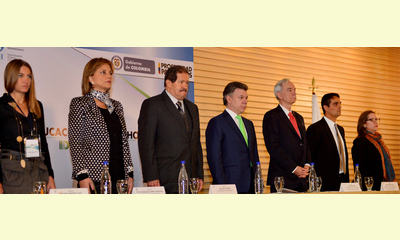|
|
Colombia should also be the most educated nation in human rights : President Santos
un article par Colombia Government Press Release
President Juan Manuel Santos said on Thursday [March
27] that just as Colombia has the goal of being the
leading nation in education in the region, it should
also be the most educated on human rights.

click on photo to enlarge
This was stated by the president during the launch
of the Ibero-American Institute of Human Rights Education
, sponsored by Organization of American States,
which was attended by several presidents and
international guests.
"And today I go beyond , inspired by the Institute
we are launching : Colombia must also be the most
educated nation in human rights ," he said .
He explained that to meet this goal, the National
Plan for Human Rights Education will be expanded in
integral form.
"We are constructing a document on Culture and
Education on Human Rights with the participation
of the Ministry of Education, the Ministry of
Culture, the National Planning Department and the
Presidential Program as well as over 20 state
agencies," he said .
Concerning the Institute, President Santos said
that "it will support - for example, the exercises
of the National Human Rights System, give
continuity to the National School of Education and
Culture in Human Rights for public officials that
has been developing during the past year."
It also said that with this school - "which is the
first project of the Institute along with the
Presidential Agency for International Cooperation
and the Presidential Program for Human Rights, we
are conducting human rights training with an
innovative pedagogy for local officials throughout
the country."
He said that this education should guarantee the
protection of human rights, because only through
education can we generate a culture that ensures
that these rights are exercised and respected by
inner conviction of individuals and society, and
not merely by legal imposition," he said .
He recalled that Colombia has been historically
respectful of its obligations under international
law and the rule of law .
"Proof of this may be seen in the profound legal
and institutional changes that the country has
experienced in recent years to ensure recognition
of the victims of the internal armed conflict," he
continued .
He reiterated that the inter-American system plays
a key role in ensuring full respect for human
rights throughout the region.
"And today I want to reiterate that our government
will continue contributing in the efforts required
to strengthen it," said President Santos .
The event was held at the headquarters of the
Chamber of Commerce of Bogotá, in the presence of
the presidents of Bolivia, Calos Mesa; of
Guatemala, Marco Vinicio Cerez ; of Dominican
Republi , Leonel Fernández and of Colombia,
Ernesto Sampe; the mayor of Zaragoza (Spain ),
former Minister Juan Alberto Belloch, and the
present Education Minister, Maria Fernanda Campo.
Also present were the Director of the Organization
of Ibero-American States for Education, Science
and Culture and the Director of the Institute of
Human Rights Education, Ángel Martín Peccis, and
the Secretary General of the Organization of
American States, Álvaro Marchesi.
(Click here for a Spanish version of this article)
|








|
DISCUSSION
Question(s) liée(s) à cet article:
What is happening in Colombia, Is peace possible?
* * * * *
Commentaire le plus récent:
The force of non-violence constrains the force of arms!
Colombia - the force of peaceful resistance -
At the beginning of July, the rebels of the armed revolutionary forces of Colombia (FARC) kidnapped a 51 year old Swiss, and his Colombian assistant who worked in the Indian communities of Cauca province where they were setting up development projects by building schools and community production enterprises.
The news of the kidnapping was spread through all the villages and 2000 Indians set out to pursue the 400 guerillas. They reached them at an elevation of over 4000 meters (12,000 feet), encircled them, and without any weapon, constrained them to release the 2 hostages! (After 2 days, the hostages were released).
This release, obtained through "peaceful resistance" has raised a national debate: the possibility of resisting violence without needing to use weapons has demonstrated the effectiveness of human solidarity movements.
"I will return, and I will then be millions" prophesied the Aymara Indian leader Tapak Katari, in 1781, at the time of his execution by the Spanish conquistadors.
100 million in 1492, the Indians were no more than 4,5 million one century and half later. Currently there are 44 million Indians populating Latin America.
In spite of their great diversity, the Indian movements take on more and more importance. In Ecuador, Guatemala, Bolivia, Peru, Mexico or Colombie they are opposed to the neoliberal system that governs the Americas, while protesting against the imposition of the American economic market. . ... continuation.

|
|









